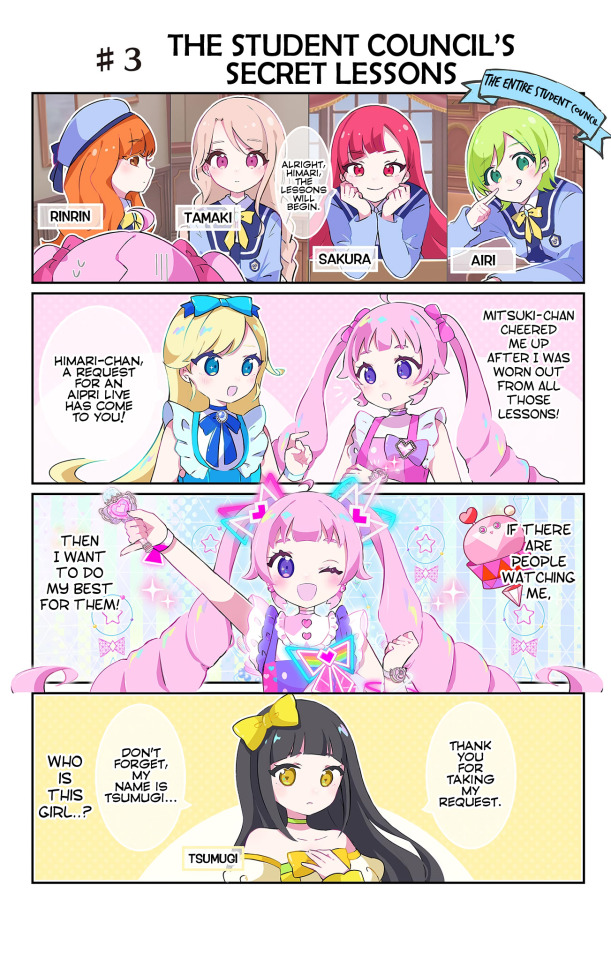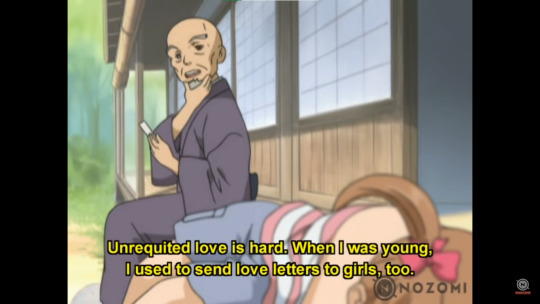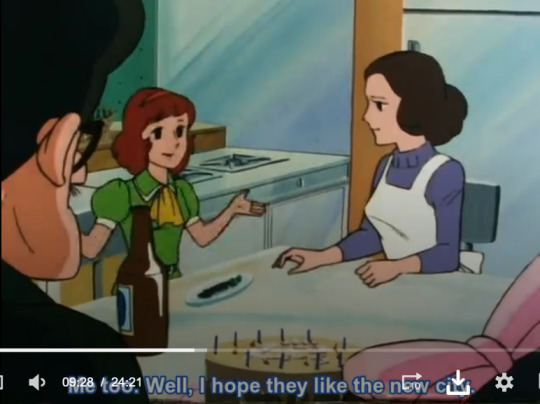Text



We've started scanlating the single-page Himitsu no AiPri ("The Secret of AiPri") 4-Koma that is released every Monday to coincide with the currently airing anime! Each comic is based on and named after the episode that just aired that same week, summarizing the events down to four panels. We've already done the first three chapters, and we (tentatively) plan on continuing for as long as it goes!
Chapters will be primarily uploaded to MangaDex under our group name.
15 notes
·
View notes
Text

Whoever is translating Minky Momo for Crunchyroll made a mistake here.
The actual word for nurse here, kangofu, refers specifically to women nurses. They're saying that Florence Nightingale is the role model for all women nurses. However, these subs omit the "women" part and said she was the role model for all nurses.
Not that a man can't look up to a woman as a role model, but it seems like the translator overlooked the fact that male nurses even exist.
#minky momo#fairy princess minky momo#magical princess minky momo#mahou no purinsesu minky momo#mahou no princess minky momo
1 note
·
View note
Text
I think My Melody could be autistic.
I wouldn't go so far as to say she's an autistic-coded character, but I do think it's a very feasible reading of the Onegai My Melody anime. Here's my evidence:
She has difficulty identifying emotional states in other people, especially negative ones.
She once tried shopping at a big, crowded supermarket, but it was too overwhelming for her, so from then on she sticks to the local farmers' market.
She seems unable to conceive that someone might have negative intentions towards her.
There's a scene where she's playing a racing game with her friend Flat, and she seemingly doesn't understand that the point of it is drive faster than the other player. She just drives the car normally.
She is never intentionally rude to anyone, but frequently says and does things that come across as insensitive. As long as it's not clearly explained to her, she doesn't notice when she inadvertently hurts someone's feelings. This is why Kuromi holds a grudge against her for such a long time.
This one wouldn't mean anything on its own, but combined with all of the above, her comment that she is "very slow at chopping vegetables" could possibly point to an impairment in fine motor skills.
#my melody#onegai my melody#sanrio#sanrio inc#sanrio characters#the main reason i could never get into hello kitty and friends#is because my melody doesn't feel like the character i first came to know and love through this anime#I have the same gripe with Hello Kitty Island Adventure although I have continued to play it because it's a great game
8 notes
·
View notes
Text
I liked Heartbreak High season 2 much more than season 1.
Maybe it's just the mood I was in when I was watching, but I felt like it was funnier.
The story was more interesting too. I only started the show because of Quinni, and throughout the first season I felt like it was only worth watching for certain characters. In season 2, I was interested in the story as a whole; every character's arc was interesting. It was just better overall.
13 notes
·
View notes
Text
The Yes! PreCure 5 OP is a banger 🦋
9 notes
·
View notes
Text

Tatsuhiko Shibusawa reference in Train to the End of the World. This is right up there with the Shuji Terayama reference in Aikatsu Stars.
#tatsuhiko shibusawa#shibusawa tatsuhiko#for context he was a HUGE influence on ja seazer#like half his songs are filled with references to this guy's books
6 notes
·
View notes
Text
#this is one of the reasons i question the shoujo status of gakuen alice
Not sure if this is a joke or not but I really do not like the implication that a shoujo protagonist can't be a girl with a crush on another girl.
I'm not even into Gakuen Alice anymore but that strikes me as a very narrow-minded thing to say.
Anyway, what determines whether something is shoujo is not its content, but the magazine it was published in. Gakuen Alice was published in Hana to Yume, a shoujo magazine; therefore it is a shoujo manga.

So, her grandpa just acknowledged (as a fact) that she, the protagonist, Mikan, has romantic feelings for another girl
And she didn’t deny it.
Cannot believe I’ve never heard of this officially licensed shoujo anime with a canonically sapphic lead.
123 notes
·
View notes
Text
In Funimation's old dub of Detective Conan ("Case Closed"), they localized everything to fit a generic American setting, from the names of people and places, to cultural references.
When Shinichi's (Jimmy's) rival, Heiji (Harley) appears, they localize his Osakan background, but don't really stay consistent. The first few times, they mention he's from a fictional city on the West Coast. Then, by the episode where the main characters visit his hometown, they settle on Alberta, Canada, making him Canadian.
This is of course, despite the fact that the visuals very clearly show Osaka, and they don't even bother to name any specific Albertan landmarks. One could argue that it's just some random city named "Alberta," but according to the dub's ADR director, Caitlin Glass, they intended to use Canada for his background.
Recalls Caitlin Glass, “Case Closed was also the first show I did any ADR directing for. Somewhere around episode 120 I did a handful of episodes, mostly revolving around the character we called Harley Hartwell (originally Heiji Hattori), Jimmy Kudo's rival. He's supposed to be from Osaka, so there's the rivalry between Tokyo and Osaka as well in the original version. Because of the localizing, our Harley was placed in Canada! I didn't have the actors give the incidental characters accents or anything, but an 'eh' or two might have made their way into the dub, just saying.” — "The One Truth, And Nothing But the One Truth: An Oral History of Case Closed"
Given the absurdity of trying to take, what is shown to us, as a distinctly Japanese city, and saying it's America, let alone Canada, I've made a compilation of the few times they localized Osaka/Kansai in the TV anime.

As an addendum, when Funimation dubbed the first six movies, they stuck to a more accurate script, keeping the changed names, but the setting and cultural references mostly Japanese. The third film, "The Last Wizard of the Century," partially takes place in Osaka, and Heiji and Kazuha (Kirsten) are part of the group. However, in the film, Osaka is just Osaka, not Alberta or anything else. For more information, see this blog on dub changes.
4 notes
·
View notes
Text
I think it's likely that, in addition to the setting, the characters of Little Memole were inspired by the novel Heidi (which also had an anime adaptation by the time that Memole was made). You have a very very cheerful and active little girl who befriends an older, sickly girl with a very strict governess, and like in Heidi, the sickly girl recovers due to her new friend's influence (though it's rather more believable in Little Memole than in Heidi, frankly, especially the novel version of Heidi).
In Little Memole, though, the strict governess character, although basically an antagonist in that she's an obstacle to Mariel's friendship with Memole (because Memole's existence must be kept a secret from most humans), ends up being more sympathetic and fleshed out compared to her counterpart in Heidi.
1 note
·
View note
Text
Tongari Boushi no Memole introduces a love triangle (not involving Memole herself) but never resolves it (at least in the traditional sense of who "gets the guy"), which is an unusual choice to be sure, but I actually don't think it's a bad one.
Initially it seems as if Grace's purpose as a character is to provide an obstacle to Mariel eventually getting together with Oscar. But that's not it. If anything, the love triangle serves mainly to spur on the conflict between Mariel and Grace and provide an obstacle to their eventual friendship. The point is for them to grow past it as characters, not for Oscar to have to choose one or the other.
1 note
·
View note
Text
This post blew up and people have tagged it with all kinds of things but the funniest to me is it being tagged with "Broadway" even though the passage states that the play in question was from Tokyo and touring in Holland.
Theatre exists outside of New York City, folks! And even in New York City, not every theatre troupe performs on Broadway.
“After a performance, I came out into the lobby where a middle-aged Dutch woman was waiting to see me. She politely inquired, “What is Hans doing now?” I responded, “Who do you mean by Hans?” “Hans Buruma, my husband,” she said. As she explained it, Hans Buruma was once in charge of mail delivery at the Amsterdam Central Post Office. Three years before, he had attended Heretics (Jashumon), a guest production from Tokyo presented by my theatre troupe at the Mickery Theater. Just after the play began, two men masked in black leaped down into the audience area, grabbed her husband by the arms, and forcibly dragged him up onto the stage. Once onstage, Hans was dressed in a costume and made up, and before he knew it, he had become a character in the play. At least two times during the course of the play, she clearly saw her husband joining other characters who together pulled the ropes. He seemed to be enjoying himself. But when the play was over, Hans never returned to his seat in the audience. The wife waited for two hours, then went to the dressing room, but the members of the company had already returned to the hotel. That night, Hans failed to come home. After two more nights, he still hadn’t returned. By then, the company had left Holland and moved on to West Germany. She thought he had joined the company, that “they hired Hans for his acting skill.” She thought, “My husband is in the play.” Now. after three years had passed, she was pleading with me, “Please give me back my husband.” I had to tell her that I had never heard this story before. Neither I nor anyone in the company knew a middle-aged Dutchman named Hans Buruma. There was no evidence indicating that such a person had been with us during the past three years. When I told her that I didn’t know him, she was on the verge of tears. “Then where is Hans?” she asked. Three years ago–one middle-aged male post-office delivery worker evaporated into our play. In this case, we cannot distinguish where the drama ends and reality begins.”
— Shuji Terayama, The Labyrinth and the Dead Sea: My Theatre, translated by Carol Sorgenfried in Unspeakable Acts: The Avant-Garde Theatre of Terayama Shuji
7K notes
·
View notes
Text
The Apothecary Diaries, in addition to having a protagonist whose personality is nothing like I've ever seen in any other anime protagonist (I mostly watch shoujo, which this series is), also has a character with face blindness/prosopagnosia. That's something I don't think I've ever seen represented in fiction at all. It's a very good series and I highly recommend it.
42 notes
·
View notes
Text
Tbh he might have made the whole thing up since the original source for it is his own book.
I knew that when I posted it, and I mentioned it in the tags (had no idea it would blow up like this months later!), but either way it was too wild not to share.
“After a performance, I came out into the lobby where a middle-aged Dutch woman was waiting to see me. She politely inquired, “What is Hans doing now?” I responded, “Who do you mean by Hans?” “Hans Buruma, my husband,” she said. As she explained it, Hans Buruma was once in charge of mail delivery at the Amsterdam Central Post Office. Three years before, he had attended Heretics (Jashumon), a guest production from Tokyo presented by my theatre troupe at the Mickery Theater. Just after the play began, two men masked in black leaped down into the audience area, grabbed her husband by the arms, and forcibly dragged him up onto the stage. Once onstage, Hans was dressed in a costume and made up, and before he knew it, he had become a character in the play. At least two times during the course of the play, she clearly saw her husband joining other characters who together pulled the ropes. He seemed to be enjoying himself. But when the play was over, Hans never returned to his seat in the audience. The wife waited for two hours, then went to the dressing room, but the members of the company had already returned to the hotel. That night, Hans failed to come home. After two more nights, he still hadn’t returned. By then, the company had left Holland and moved on to West Germany. She thought he had joined the company, that “they hired Hans for his acting skill.” She thought, “My husband is in the play.” Now. after three years had passed, she was pleading with me, “Please give me back my husband.” I had to tell her that I had never heard this story before. Neither I nor anyone in the company knew a middle-aged Dutchman named Hans Buruma. There was no evidence indicating that such a person had been with us during the past three years. When I told her that I didn’t know him, she was on the verge of tears. “Then where is Hans?” she asked. Three years ago–one middle-aged male post-office delivery worker evaporated into our play. In this case, we cannot distinguish where the drama ends and reality begins.”
— Shuji Terayama, The Labyrinth and the Dead Sea: My Theatre, translated by Carol Sorgenfried in Unspeakable Acts: The Avant-Garde Theatre of Terayama Shuji
7K notes
·
View notes
Text
#why can't I find anything about this story what#like the publication this lists as a source seems to exist on jstor but that's it#shuji terayama
It might be made up tbh--the author of this book that this translation was in, Carol Fisher Sorgenfrei, said that Terayama did not always tell the truth.
Someone else in the notes pointed out, there was a critic named Ian Buruma who wrote about Terayama's work; if the story is made up, Hans might be named after him.
I actually tried emailing Ian Buruma to see if he knew anything, but I never got a response.
“After a performance, I came out into the lobby where a middle-aged Dutch woman was waiting to see me. She politely inquired, “What is Hans doing now?” I responded, “Who do you mean by Hans?” “Hans Buruma, my husband,” she said. As she explained it, Hans Buruma was once in charge of mail delivery at the Amsterdam Central Post Office. Three years before, he had attended Heretics (Jashumon), a guest production from Tokyo presented by my theatre troupe at the Mickery Theater. Just after the play began, two men masked in black leaped down into the audience area, grabbed her husband by the arms, and forcibly dragged him up onto the stage. Once onstage, Hans was dressed in a costume and made up, and before he knew it, he had become a character in the play. At least two times during the course of the play, she clearly saw her husband joining other characters who together pulled the ropes. He seemed to be enjoying himself. But when the play was over, Hans never returned to his seat in the audience. The wife waited for two hours, then went to the dressing room, but the members of the company had already returned to the hotel. That night, Hans failed to come home. After two more nights, he still hadn’t returned. By then, the company had left Holland and moved on to West Germany. She thought he had joined the company, that “they hired Hans for his acting skill.” She thought, “My husband is in the play.” Now. after three years had passed, she was pleading with me, “Please give me back my husband.” I had to tell her that I had never heard this story before. Neither I nor anyone in the company knew a middle-aged Dutchman named Hans Buruma. There was no evidence indicating that such a person had been with us during the past three years. When I told her that I didn’t know him, she was on the verge of tears. “Then where is Hans?” she asked. Three years ago–one middle-aged male post-office delivery worker evaporated into our play. In this case, we cannot distinguish where the drama ends and reality begins.”
— Shuji Terayama, The Labyrinth and the Dead Sea: My Theatre, translated by Carol Sorgenfried in Unspeakable Acts: The Avant-Garde Theatre of Terayama Shuji
7K notes
·
View notes
Text

The subbers just added in the word "communist" for no reason,,, okay??
Also, I doubt it's 10 teachers per student, but probably different teachers for different subjects who all have multiple students.
2 notes
·
View notes
Text

Contrary to what these subs say, Chiko is not saying she hopes the friend she's mad at likes the city she just moved to--she's saying she hopes she's get an even better friend soon.
1 note
·
View note
Text

This is not what she said at all. I wonder if this sub is based on another country's dub of this anime, because the way they translated it is not even close.
I couldn't make out the whole line, but it sounded like this character (Chiko's younger sister) said something like, "Maybe it's because of a boyfriend."
In fact, Chiko's bad mood is because of a girl friend: she had promised that she wouldn't move away until after Chiko's birthday, and Chiko had hand-knitted a scarf to give her, but her friend had to move earlier than expected and couldn't make it, so Chiko feels betrayed.
1 note
·
View note